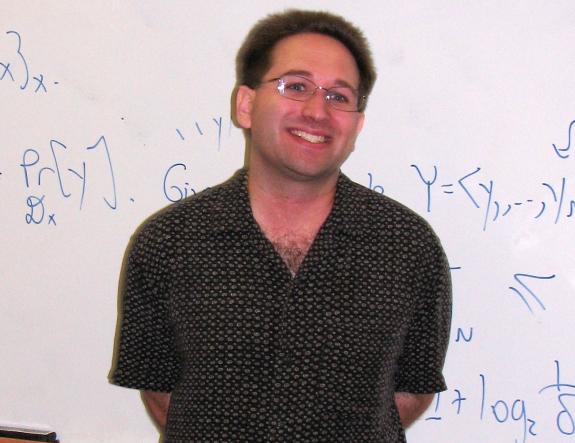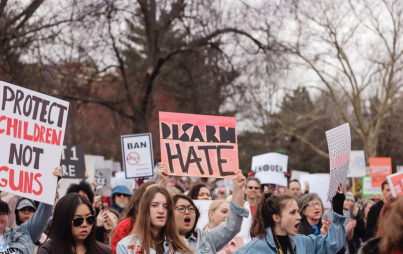
Credit: Wikipedia Commons
Feminism hurts men.
That's not an original sentiment, but it has rarely been articulated so painfully, and with such good faith, as in a recent blog comment by MIT computer science professor Scott Aaronson. In a long, impassioned post, Aaronson explains that he was a nerdy guy in high school and beyond, and that his reading of feminist literature (especially Andrea Dworkin) left him with a paralyzing fear that his sexual desire would harm women.
"Here’s the thing: I spent my formative years—basically, from the age of 12 until my mid-20s—feeling not “entitled,” not “privileged,” but terrified. I was terrified that one of my female classmates would somehow find out that I sexually desired her, and that the instant she did, I would be scorned, laughed at, called a creep and a weirdo, maybe even expelled from school or sent to prison. You can call that my personal psychological problem if you want, but it was strongly reinforced by everything I picked up from my environment: to take one example, the sexual-assault prevention workshops we had to attend regularly as undergrads, with their endless lists of all the forms of human interaction that “might be” sexual harassment or assault, and their refusal, ever, to specify anything that definitely wouldn’t be sexual harassment or assault. I left each of those workshops with enough fresh paranoia and self-hatred to last me through another year."
Aaronson says he actually begged a doctor at one point to chemically castrate him so that he could focus on math and science, and not be tormented by the terrible, terrifying threat of desire.
Laura Pennie had a compassionate response in which she argued that Aaronson's anguish was the result of patriarchy, not of feminism—and Aaronson, who is himself strongly pro-feminist, agreed (albeit somewhat ambivalently). But neither of them really explain why Aaronson's problems stem from patriarchy. After all, Aaronson's fear of his body and his desire came from reading Andrea Dworkin. That sounds like feminism's fault, not patriarchy's. As Aaronson says, "the notion of 'Patriarchy' is sufficiently elastic as to encompass almost anything about the relations between the sexes that is, or has ever been, bad or messed up."
If patriarchy is so diffuse, of what use is the concept? And how can it really explain Aaronson's torment?
I have a two-part answer. First, I don't think Aaronson's torment was specifically linked to feminism because I had an experience much like his—and it didn't have anything to do with reading feminist authors. I was a virgin through college and well beyond; I never kissed a woman until my wife decided that I was damn well going to, and made sure I did. I was certainly well-read in feminism (I liked Andrea Dworkin's writing too), but I wasn't terrified of dating because I feared I'd accidentally rape someone or be accused of sexual assault. I was just shy and nervous around women, and perhaps a bit unlucky. Based on my own experience, you can be a nerdy guy with more or less the same problems as Aaronson without feminism being the root issue—which suggests that feminism, maybe, isn't the real culprit.
Second, I think it's worth pointing out that Aaronson figures feminism as a prohibition enforced by violence and even, explicitly, by castration. You don't need to be deeply versed in Freud to recognize that as a familiar dynamic. Feminism, in Aaronson's account, fits precisely into the place of the ogre-father; the law-giving monster who hordes the women for him (or her) self. In his account, Aaronson even seems to see women and the patriarchs in collaboration against him: "The same girls who I was terrified would pepper-spray me and call the police if I looked in their direction, often responded to the crudest advances of the most Neanderthal of men by accepting those advances." Feminism allocates women to the powerful brutes, and keeps them from the weak sons—which is exactly what is supposed to happen under patriarchy.
So does that mean that it's all the fault of patriarchy, and feminism is blameless? Not precisely. Instead, it seems like Aaronson's discussion points to ways in which feminism—or at least the radical feminism typified by Andrea Dworkin—can actually mirror, or reproduce, tropes from the patriarchy.
As I said, I admire Dworkin a lot; she's a passionate writer, and an often brilliant analyst. But she does tend to see men as always everywhere the violent aggressors, and women as always everywhere the victims—a formulation which fits neatly into patriarchy's vision of men as the important heroes and villains, dividing up the feminine bodies for spoils.
The main way that Dworkin reproduces patriarchy, though, is in her misandry. People often caricature feminists as man-haters, and Dworkin certainly could express great antipathy towards men and masculinity. But what both feminists and anti-feminists can be loath to admit is that patriarchy hates men too—and even more so. Who historically, has killed more men—men or women? Who murders men singly on the street, or slaughters them in wartime? It's not women, for the most part. Nor is it an accident that cultural narratives, especially cultural narratives aimed at men, so often romanticize violence between guys: Superman vs. Lex Luthor; Skywalker vs. Vader, James Bond vs. Dr. No, Harry Potter vs. Voldemort, and on and on.
Patriarchy teaches men to envy and desire and loathe masculinity, both out there and in themselves. It positions women as victims or conquests in an internal male psychodrama, rather than as people in their own right. And that's exactly the story Aaronson tells of his experience with feminism. Andrea Dworkin led him right into the same patriarchal hell as ever. The lesson of his parable, then, isn't that feminism oppresses men. It's that the struggle of feminism isn't just to overthrow the patriarchal law, but to make sure that nothing, not even feminism, replaces it.






